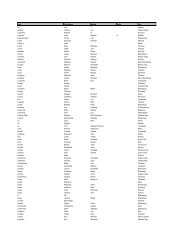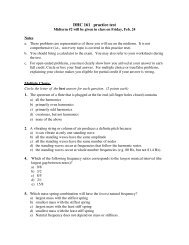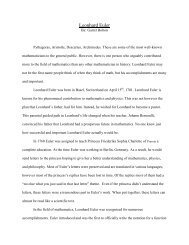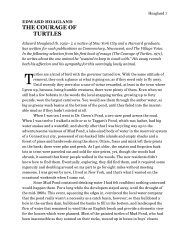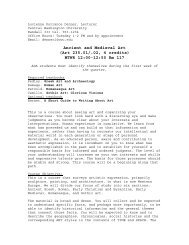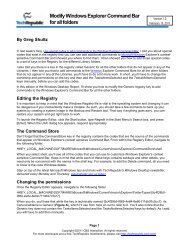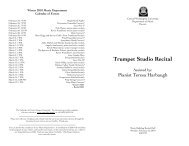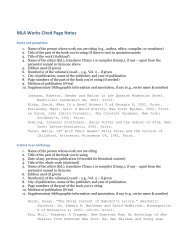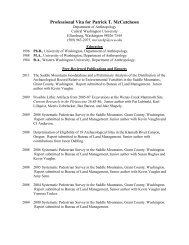The Ingenious Gentleman Don Quixote de la Mancha
The Ingenious Gentleman Don Quixote de la Mancha
The Ingenious Gentleman Don Quixote de la Mancha
Create successful ePaper yourself
Turn your PDF publications into a flip-book with our unique Google optimized e-Paper software.
<strong>Don</strong> <strong>Quixote</strong> <strong>de</strong> <strong>la</strong> <strong>Mancha</strong> 193 <br />
<br />
her hid<strong>de</strong>n treasures. And do not suppose, señor, that I apply the term vulgar here <br />
merely to plebeians and the lower or<strong>de</strong>rs; for everyone who is ignorant, be he lord <br />
or prince, may and should be inclu<strong>de</strong>d among the vulgar. He, then, who shall <br />
embrace and cultivate poetry un<strong>de</strong>r the conditions I have named, shall become <br />
famous, and his name honored throughout all the civilized nations of the earth. And <br />
with regard to what you say, señor, of your son having no great opinion of Spanish <br />
poetry, I am inclined to think that he is not quite right there, and for this reason: the <br />
great poet Homer did not write in Latin, because he was a Greek, nor did Virgil write <br />
in Greek, because he was a Latin; in short, all the ancient poets wrote in the <br />
<strong>la</strong>nguage they imbibed with their mother's milk, and never went in quest of foreign <br />
ones to express their sublime conceptions; and that being so, the usage should in <br />
justice extend to all nations, and the German poet should not be un<strong>de</strong>rvalued <br />
because he writes in his own <strong>la</strong>nguage, nor the Castilian, nor even the Biscayan, for <br />
writing in his. But your son, señor, I suspect, is not prejudiced against Spanish <br />
poetry, but against those poets who are mere Spanish verse writers, without any <br />
knowledge of other <strong>la</strong>nguages or sciences to adorn and give life and vigor to their <br />
natural inspiration; and yet even in this he may be wrong; for, according to a true <br />
belief, a poet is born one; that is to say, the poet by nature comes forth a poet from <br />
his mother's womb; and following the bent that heaven has bestowed upon him, <br />
without the aid of study or art, he produces things that show how truly he spoke <br />
who said, 'Est Deus in nobis,' etc. 49 At the same time, I say that the poet by nature <br />
who calls in art to his aid will be a far better poet, and will surpass him who tries to <br />
be one relying upon his knowledge of art alone. <strong>The</strong> reason is, that art does not <br />
surpass nature, but only brings it to perfection; and thus, nature combined with art, <br />
and art with nature, will produce a perfect poet. To bring my argument to a close, I <br />
would say then, gentle sir, let your son go on as his star leads him, for being so <br />
studious as he seems to be, and having already successfully surmounted the first <br />
step of the sciences, which is that of the <strong>la</strong>nguages, with their help he will by his own <br />
exertions reach the summit of polite literature, which so well becomes an <br />
<br />
49 <strong>The</strong>re is a god in us.



